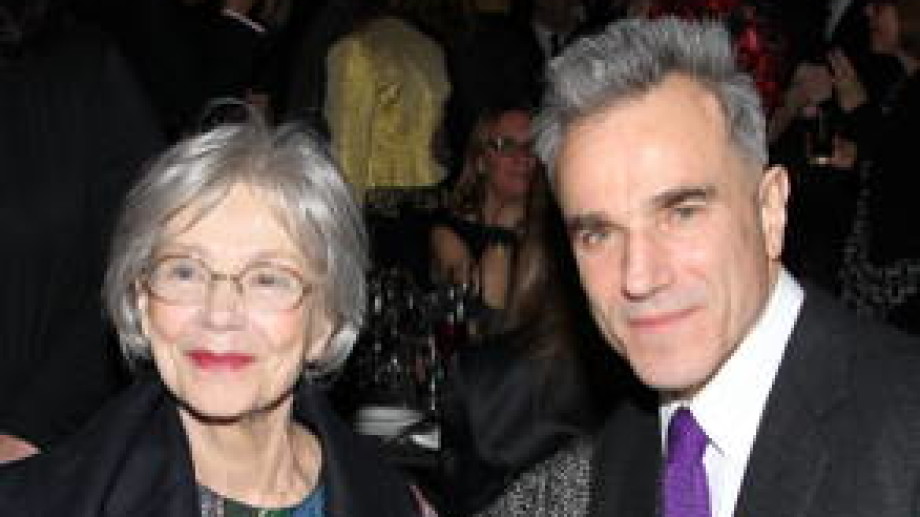
Zero Dark Thirty filmmakers Kathryn Bigelow and Mark Boal at the NYFCC awards last night. Photo by Dave Allocca/StarPix
With Oscar nominations and Golden Globe awards on tap this week, the buzz for a number of new films is reaching a peak. Film critics in New York City cast their brightest light on Kathryn Bigelow's increasingly polarizing Zero Dark Thirty on Monday in Manhattan. Lincoln, Amour, How To Survive a Plague and The Central Park Five were also celebrated by the New York Film Critics Circle last night, ahead of Thursday's big announcement from the Academy and Sunday's prizes from Hollywood's foreign press.
Hailed by New York film critics just three years ago for her first collaboration with Mark Boal, The Hurt Locker, Bigelow received the same prizes from the NYFCC this year. Accepting the Best Picture and Best Director awards, director/producer Bigelow and writer/producer Boal seized the opportunity to defend themselves and their new film.
“I thankfully want to say that I’m standing in a room of people who understand that depiction is not endorsement, and if it was, no artist could ever portray inhumane practices; no author could ever write about them; and no filmmaker could ever delve into the naughty subjects of our time,” filmmaker Kathryn Bigelow explained in an attempt to burst the expanding bubble of criticism about the portrayal of torture (and its role in the capture of Osama Bin Laden) as seen in Zero Dark Thirty.
Charges that Boal and Bigelow were lead astray by Obama administration insiders and other government officials have lead U.S. Senators to call for an inquiry into the matter and heightened charges that the the duo took extreme license in telling their story.
“In case anyone is asking, we stand by the film,” Mark Boal defended. “I think at the end of the day, we made a film that allows us to look back at the past in a way that gives us a more clear-sighted appraisal of the future.”

How to Survive a Plague director David France on the red carpet. Photo by Dave Allocca/StarPix
Critics and filmmakers may have arrived at the Crimson Club on Monday night knowing the names of those who would walk home with prizes, but the annual New York Film Critics Circle Awards ceremony was hardly a scripted affair.
Early on in the evening, as filmmaker Michael Moore stood up to present the best first feature prize to David France for his debut documentary How to Survive a Plague, Moore offered an extended speech in support of the movie and the astounding archival footage used in it. Proclaiming his support for ACT-UP and their protests, as seen in the film, Moore highlighted the group's activist demonstrations against the Catholic Church in the 1980s.
Michael Moore's impassioned praise for Plague only became more emphatic after one New York Film Critics Circle member heckled him from the audience with an audible “fuck you.” The remark stirred the crowd and then the critic repeated the expletive. Moore kept right on going and brought filmmaker David France on stage to a loud ovation.
France took the high road in his remarks, saying that as a journalist he felt a special bond with the film critics in the room. He offered, brightly: “There is life after print!”
Chris Rock honored another acclaimed nonfiction film, The Central Park Five. On stage to salute the film, he praised it as the very best movie he saw all year. The film, about the 1980s Central Park jogger case in which a group of five kids were wrongly charged with raping a woman, Rock said simply last night: “We all got it wrong.”

Amour star Emmanuelle Riva with Lincoln star Daniel Day-Lewis. Photo by Dave Allocca/StarPix
Last night's event was an emotional event for some.
Lincoln lead Daniel Day-Lewis took the stage after an extended introduction from director Steven Spielberg. Apparently, Day-Lewis rejected the role of the acclaimed American President more than once and Spielberg read the emails to prove it. The actor rejected the role based on early versions of the script. Day-Lewis said that it was best screenplay winner Tony Kushner's writing that eventually sealed the deal for him. As he choked up he said that he owes Spielberg and Kushner everything.
Meanwhile, best supporting actress winner Sally Field was equally effusive about her director, writer and co-stars as they watched from the audience. But, she saved her most emphatic praise for the character she portrayed: Abraham Lincoln's wife, Mary Todd Lincoln. Saluting her character, she said it was hard to let Lincoln go. She praised the First Lady and other “complicated and brilliant women who were not and are not allowed a place at the table.”
On an evening when the two top prizes went to a strong female filmmaker—for the second time in just a few years, no less—it's clear that in the world of film, such women are fighting to be seated front and center from now on.



